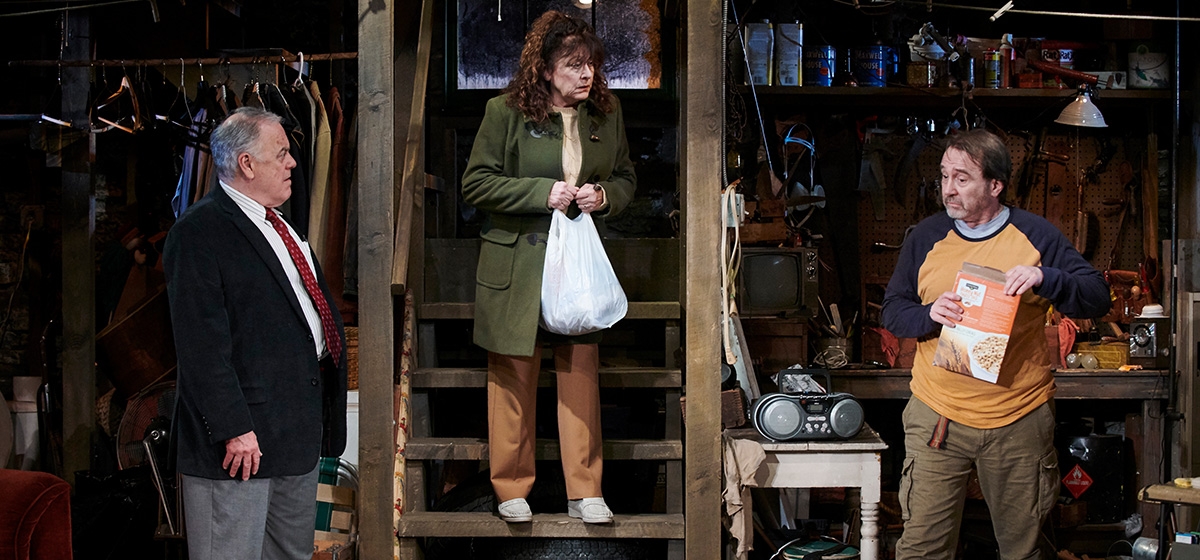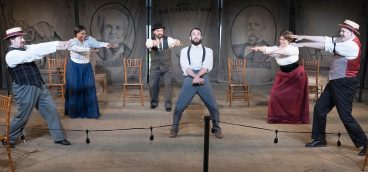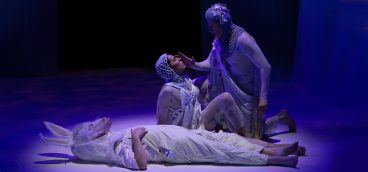City Theatre’s “Downstairs” Showcases Pittsburgh’s Dazzling Acting Talent

The stage of City Theatre’s “Downstairs” is an open maw of things forsaken, a dirty basement stuffed with so many neglected and discarded items—tools and tires and crates and old clothes and worn-out furniture—that it casts the audience in the dingy ether of pathos well before the lights go down. Tony Ferrieri’s overpowering set is like a Robbe-Grillet novel: it’s an infinity of realistic details devoid of gimmickry, that’s so visceral, you can literally taste and smell the mold and dust and decay of the lives that must be living in the house above it. It’s so organic that it’s a character itself.
This is the power of Theresa Rebeck’s 2017 play, which is more about showing than telling, and details rather than platitudes. There is much dialogue—nearly two hours’ worth—and it spools forth with increasing velocity, relieved only by brief blackouts between the eight scenes. Rebeck is a good, not a great writer, but she is daring, and sometimes that’s more important in theater. She is daring because she hands the success or failure of her work entirely to the actors who, if strong, will carry it to great heights, as they do in this production. She is not a stylist like Mamet, or a surrealist like Pinter, or a minimalist like Beckett, nor a humorist like Ayckbourn, but rather, she is a master of the prosaic, which is actually a much harder form to achieve than it may seem. Her style is to stack up the simple, everyday words between her characters much like the basement is stacked up with the detritus of their simple, everyday lives. Nothing is too valuable or precious—the import is in the volume, and the balance.
Cast in the three roles—which are not unlike the three roles of a classic Sophoclean tragedy—are three of Pittsburgh’s best actors, which should be reason enough to see this show. Martin Giles literally worms his way into the emotional crevices of the parasitic Teddy, the loser (and younger) brother of Irene, played by Helena Ruoti. As the story starts in medias res, we don’t know where he’s been or why he’s in Irene’s basement—this again is part of the playwright’s method of not telling us what we don’t need to know—but he emerges from the commode like a character in a Francis Bacon painting, half naked and stumbling around this dungeon-like world in total complacency. It’s certainly no “Birth of Venus.” But there is a beauty in the way Teddy navigates his crepuscular terrain, happy to live in dirty clothes, drink from the same coffee grounds day after day, and subsist on his only food: cereal (or as he refers to it, “just a bit of lies and sugar”).
Director Marc Masterson gives Teddy all the time he wants to limn the mundane routines of this itinerant environment; it’s like watching a Beckett character discover the minutiae of his existence with equal parts disdain and fascination. Masterson’s staging is naturalistic, so the characters can flow over the wide space of the set with what appears to be their own sense of impulsiveness. However, he’s instilled a sense of discipline to the dialogue, as it’s a 105-minute show with no intermission, and the collective bladder of the audience cannot be taken for granted.
Ruoti, as Irene, unfurls her character as slowly as Giles does. They’re siblings that haven’t seen each other in years, but they act like teenagers on a first date; there’s a lot of reconnecting they have to do before they can even begin to inhabit their current moment together.
Teddy and Irene are both stunted souls who suffer psychological scars from others. For Teddy, it was their crazy mother, and for Irene, it’s her current husband, Gerry, played by John Shepard. Gerry is lurking “upstairs” for much of the play, his name invoked with a kind of diabolical reverence. We never see the upper floor, but set designer Ferrieri has installed long slender stairways down to the stage, that are lit during the blackouts the way old Hollywood films would depict celestial escalators.
When we finally meet Gerry, it’s as if Lawrence Tierney’s character in “Born to Kill” had moved to the suburbs, fathered a son, and it grew up to be Gerry. Without giving too much away, Shepard exudes that same sense of smug pathology, and when his darker nature eventually emerges, he’s proud of it, like a neophyte painter showing off his work for the first time.
Ruoti does a brilliant job navigating the long arc of her character’s evolution. She’s sandwiched between two very tendentious men, and fights her way through the action of the drama by employing both pliancy and obstinance. A lesser actor would show the stitches of each emotional shift; in Ruoti’s case, they’re seamless. We believe she’s capable of such growth because she shows us the growth. We really aren’t told anything in this play. We are witnesses.
Although normally the less-is-more approach is a plus in drama, in this case, the plot flirts with abstraction in a gratuitous, almost annoying manner. This is a production that will live in your mind because of the acting, not the dramatic construction.
Brian Lilienthal handles the lighting like an impressionist. His moonlight doesn’t shine from the basement windows, it floats through them like it would in real life, coming from different angles and with varying degrees of filtration. And the luminosity cast by the staircases between scenes could easily be mistaken for one of artist Robert Irwin’s conceptual installations.
Steve Shapiro provides the excellent sound, while Angela Vesco’s costume design captures the degradation of Teddy’s life in each mismatched sock and decrepit shirt. And stage manager Taylor Meszaros engenders the fluidity of movement with the multifarious props the actors must wrangle.
One of the best things about City Theatre is that all the seats in the house provide a clear, immediate view of the stage. If you love strong acting by professionals who are masters of their craft, you will get to really see it in this remarkable production.
“Downstairs” continues through Feb. 2 at City Theatre, 1300 Bingham Street, South Side. $29–79. 412-431-2849 or www.citytheatrecompany.org.





